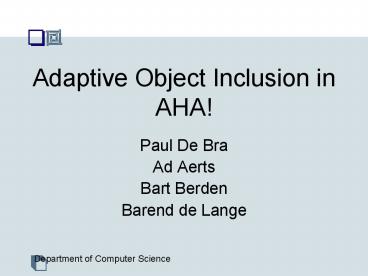Adaptive Object Inclusion in AHA! - PowerPoint PPT Presentation
Title:
Adaptive Object Inclusion in AHA!
Description:
Data storage (domain, adaptation, user model) using XML files or mySQL database. High-level authoring of domain- and adaptation model through Java Applets ... – PowerPoint PPT presentation
Number of Views:34
Avg rating:3.0/5.0
Title: Adaptive Object Inclusion in AHA!
1
Adaptive Object Inclusion in AHA!
- Paul De Bra
- Ad Aerts
- Bart Berden
- Barend de Lange
2
Topics
- The AHA! Project
- Adaptive Object Inclusion
- Stable Presentations
- Conclusions / Future Work
3
The AHA! Project
- AHA! Adaptive Hypermedia Architecture
- Open Source project, Web-based adaptive engine
- Built on Java Servlet technology, XML and XHTML
- General-purpose user-model and adaptation rules
- Data storage (domain, adaptation, user model)
using XML files or mySQL database - High-level authoring of domain- and adaptation
model through Java Applets - Compilers from authoring to engine structures
4
Main AHA! Engine Features
- AHA! mainly reacts to page accesses
- Each resource (page) is associated with a concept
- The access event triggers rules that update
attributes of user model concepts - Each attribute update may trigger more rules that
update more attributes of more concepts - Links in the requested page are annotated based
on expressions on attribute values - Fragments and objects are conditionally included
based on expressions on attribute values
5
Adaptive Object Inclusion
- Reasons for adaptive object inclusion
- prerequisite explanation (include when needed to
understand concept) - comparative or additional explanation (include
when user is ready for it) - choose between media items (text, audio, image,
video) - same object may be included in different pages
having separate objects eliminates redundant
copies
6
Adaptive Object Inclusion in AHA!
- Adaptation Rules determine inclusion of objects
- casegroup works like a switch statement in C
to decide which object to include - the inclusion causes a new access event
triggering the adaptation rules of the included
object - included objects can thus influence how object
inclusion and link adaptation works for objects
further down on the same page
7
(No Transcript)
8
Potential Problems with Object Inclusion
- When an object is included in several pages or
several times on a page - each access to the object triggers adaptation
- the user may not recognize the adapted object or
page when it is revisited - When many objects are included on a page
- the page is difficult to author (many object
tags) - it is difficult for an author to remember what
the (possible) contents of the page is
9
Stable Presentations in AHA!
- Adaptation is less noticeable when it is done
once, when the user first sees the object (or
page) - stable forever (one-time adaptation)
- stable for one session (adaptation reoccurs in
the next session) - stable as long as an expression remains true
(stable until some threshold is reached)
10
Handling Many Small Fragments
- AHA! 3.0 is backward compatible with AHA! 2.0
- conditional inclusion of fragments through if
statements inside the page - all possible variations are visible to the author
- the if statements cause pages not to be in
standard xhtml - conditionally included fragments do not generate
an event (and thus do not generate any user model
update)
11
Conclusions / Future Work
- Object inclusion and stable presentations make
AHA! a more versatile/powerful as an AHS - Using these features effectively is not trivial
for authors we need authoring tools that use
high-level structures - one such tool is an Interbook to AHA! compiler
(but that does not use object inclusion or stable
presentations yet because Interbook does not use
them) - more tools are being developed in the ADAPT
project (101144-CP-1-2002-NL-MINERVA-MPP)































